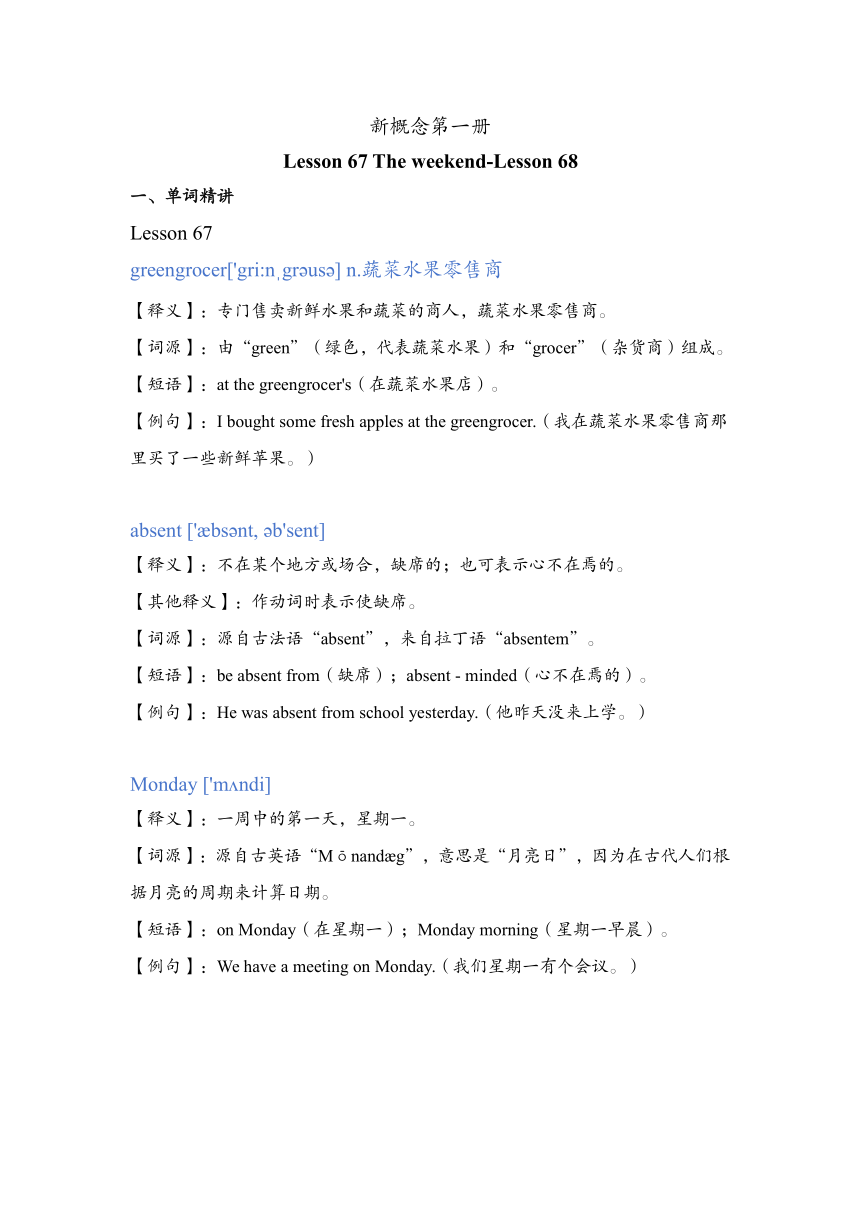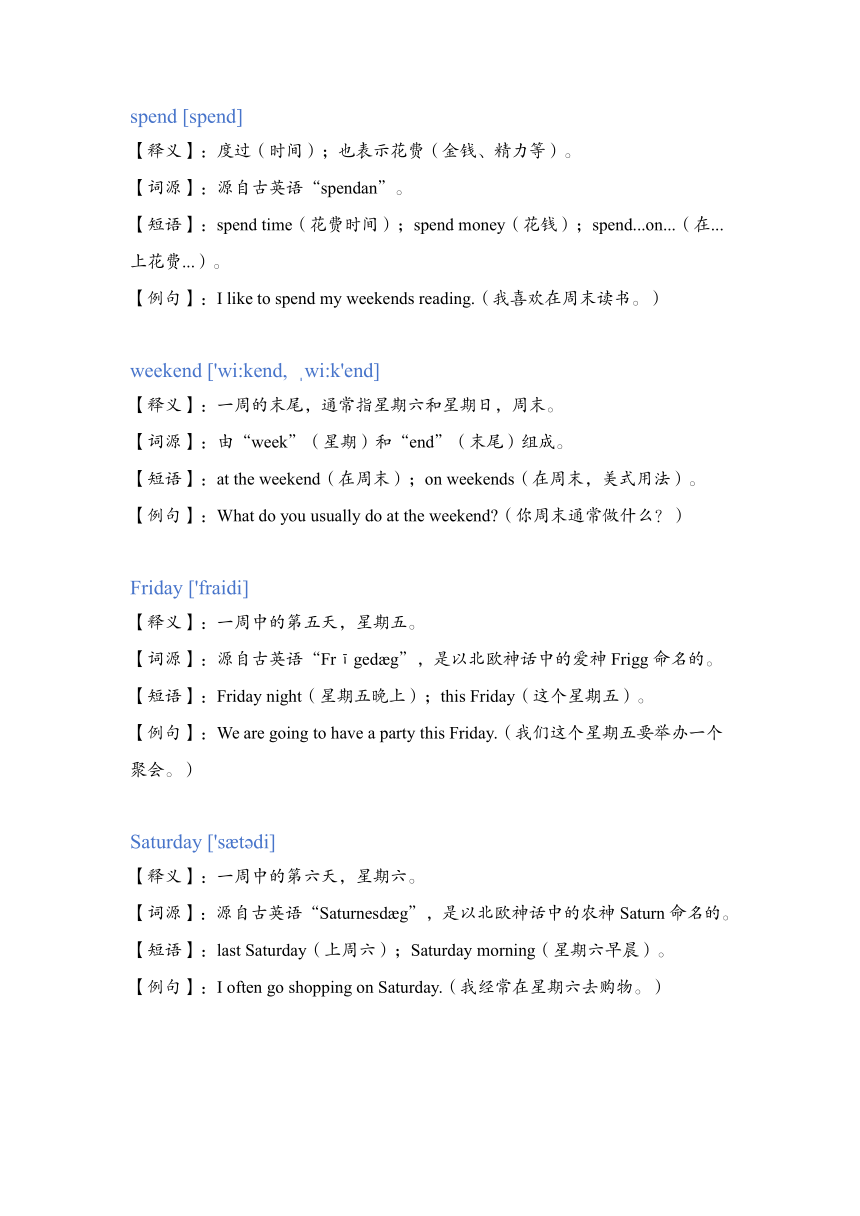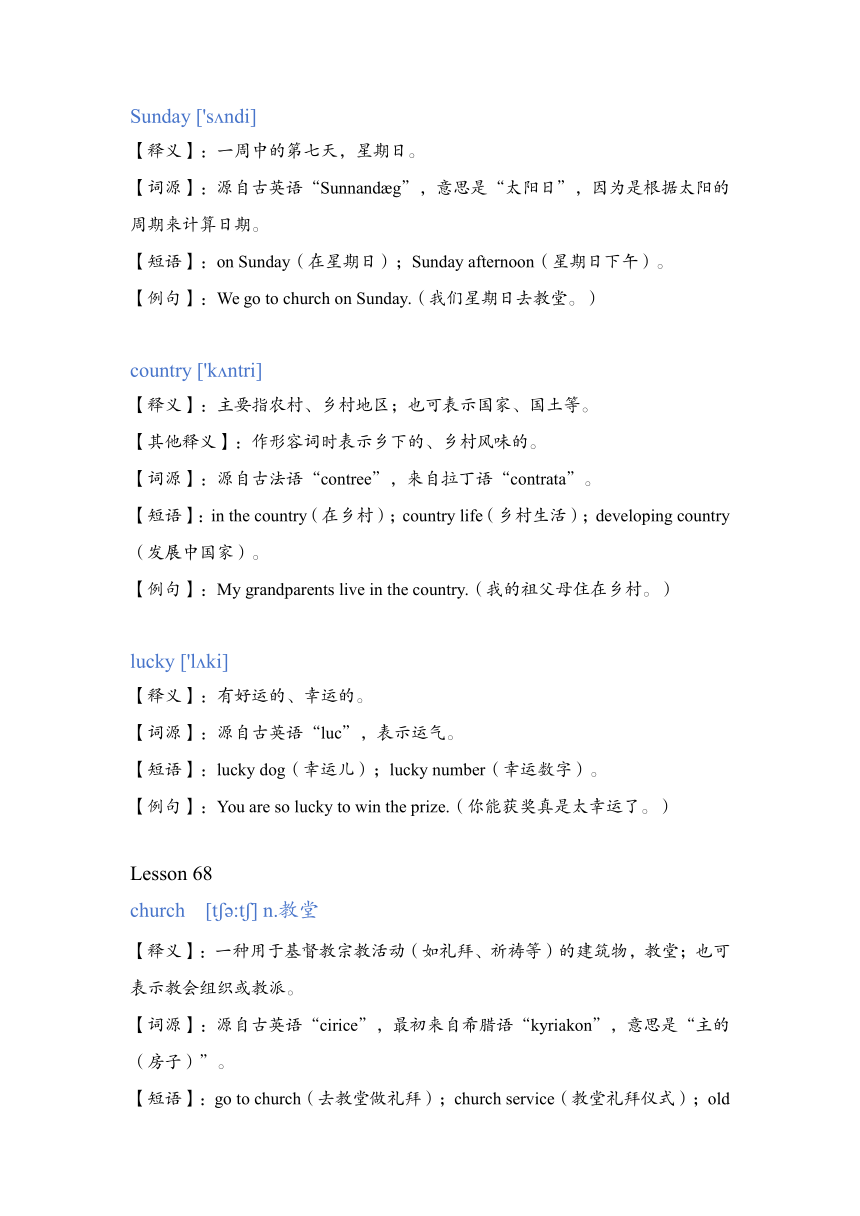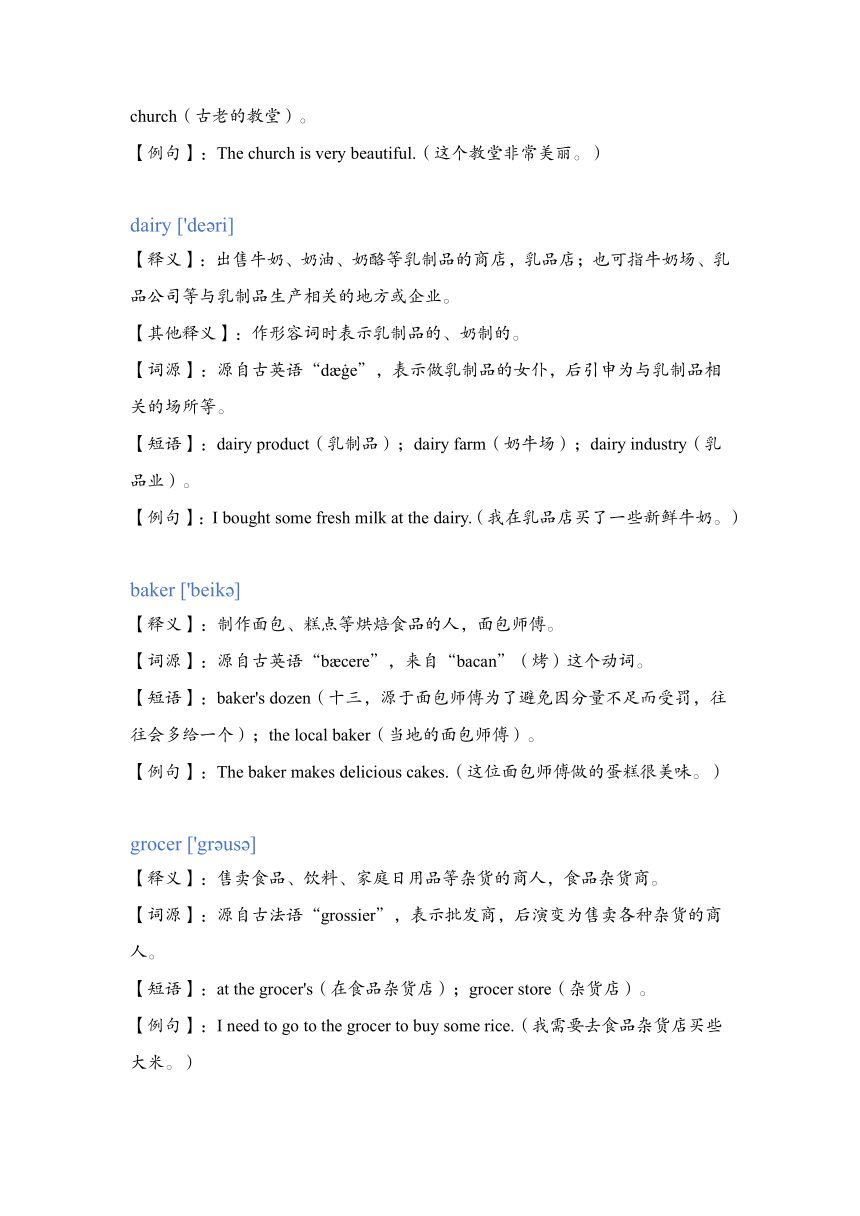新概念第一册Lesson 67 The weekend-Lesson 68讲义
文档属性
| 名称 | 新概念第一册Lesson 67 The weekend-Lesson 68讲义 |

|
|
| 格式 | docx | ||
| 文件大小 | 146.7KB | ||
| 资源类型 | 教案 | ||
| 版本资源 | 新概念英语 | ||
| 科目 | 英语 | ||
| 更新时间 | 2024-12-03 00:00:00 | ||
图片预览





文档简介
新概念第一册
Lesson 67 The weekend-Lesson 68
单词精讲
Lesson 67
greengrocer['gri:n gr us ] n.蔬菜水果零售商
【释义】:专门售卖新鲜水果和蔬菜的商人,蔬菜水果零售商。
【词源】:由“green”(绿色,代表蔬菜水果)和“grocer”(杂货商)组成。
【短语】:at the greengrocer's(在蔬菜水果店)。
【例句】:I bought some fresh apples at the greengrocer.(我在蔬菜水果零售商那里买了一些新鲜苹果。)
absent [' bs nt, b'sent]
【释义】:不在某个地方或场合,缺席的;也可表示心不在焉的。
【其他释义】:作动词时表示使缺席。
【词源】:源自古法语“absent”,来自拉丁语“absentem”。
【短语】:be absent from(缺席);absent - minded(心不在焉的)。
【例句】:He was absent from school yesterday.(他昨天没来上学。)
Monday ['m ndi]
【释义】:一周中的第一天,星期一。
【词源】:源自古英语“Mōnand g”,意思是“月亮日”,因为在古代人们根据月亮的周期来计算日期。
【短语】:on Monday(在星期一);Monday morning(星期一早晨)。
【例句】:We have a meeting on Monday.(我们星期一有个会议。)
Tuesday ['tju:zdi:, 'tu:z-]
【释义】:一周中的第二天,星期二。
【词源】:源自古英语“Tīwesd g”,是以北欧神话中的战神Tyr命名的。
【短语】:next Tuesday(下周二);Tuesday afternoon(星期二下午)。
【例句】:She has a piano lesson on Tuesday.(她星期二有一节钢琴课。)
Wednesday ['wenzdi]
【释义】:一周中的第三天,星期三。
【词源】:源自古英语“Wōdnesd g”,是以北欧神话中的奥丁神(Odin)命名的。
【短语】:every Wednesday(每个星期三);Wednesday evening(星期三晚上)。
【例句】:The party is on Wednesday.(聚会在星期三。)
Thursday ['θ :zdi]
【释义】:一周中的第四天,星期四。
【词源】:源自古英语“ ūnresd g”,是以北欧神话中的雷神Thor命名的。
【短语】:last Thursday(上周四);Thursday night(星期四晚上)。
【例句】:He will go on a trip this Thursday.(他这个星期四要去旅行。)
keep [ki:p]
【释义】:使(身体健康)处于(某种状况),保持;还有保存、保留、遵守等多种含义。
【其他释义】:作名词时表示生计等。
【词源】:源自古英语“cepan”。
【短语】:keep healthy(保持健康);keep in touch(保持联系);keep on(继续)。
【例句】:You should keep your room clean.(你应该保持你的房间干净。)
spend [spend]
【释义】:度过(时间);也表示花费(金钱、精力等)。
【词源】:源自古英语“spendan”。
【短语】:spend time(花费时间);spend money(花钱);spend...on...(在...上花费...)。
【例句】:I like to spend my weekends reading.(我喜欢在周末读书。)
weekend ['wi:kend, wi:k'end]
【释义】:一周的末尾,通常指星期六和星期日,周末。
【词源】:由“week”(星期)和“end”(末尾)组成。
【短语】:at the weekend(在周末);on weekends(在周末,美式用法)。
【例句】:What do you usually do at the weekend (你周末通常做什么?)
Friday ['fraidi]
【释义】:一周中的第五天,星期五。
【词源】:源自古英语“Frīged g”,是以北欧神话中的爱神Frigg命名的。
【短语】:Friday night(星期五晚上);this Friday(这个星期五)。
【例句】:We are going to have a party this Friday.(我们这个星期五要举办一个聚会。)
Saturday ['s t di]
【释义】:一周中的第六天,星期六。
【词源】:源自古英语“Saturnesd g”,是以北欧神话中的农神Saturn命名的。
【短语】:last Saturday(上周六);Saturday morning(星期六早晨)。
【例句】:I often go shopping on Saturday.(我经常在星期六去购物。)
Sunday ['s ndi]
【释义】:一周中的第七天,星期日。
【词源】:源自古英语“Sunnand g”,意思是“太阳日”,因为是根据太阳的周期来计算日期。
【短语】:on Sunday(在星期日);Sunday afternoon(星期日下午)。
【例句】:We go to church on Sunday.(我们星期日去教堂。)
country ['k ntri]
【释义】:主要指农村、乡村地区;也可表示国家、国土等。
【其他释义】:作形容词时表示乡下的、乡村风味的。
【词源】:源自古法语“contree”,来自拉丁语“contrata”。
【短语】:in the country(在乡村);country life(乡村生活);developing country(发展中国家)。
【例句】:My grandparents live in the country.(我的祖父母住在乡村。)
lucky ['l ki]
【释义】:有好运的、幸运的。
【词源】:源自古英语“luc”,表示运气。
【短语】:lucky dog(幸运儿);lucky number(幸运数字)。
【例句】:You are so lucky to win the prize.(你能获奖真是太幸运了。)
Lesson 68
church [t :t ] n.教堂
【释义】:一种用于基督教宗教活动(如礼拜、祈祷等)的建筑物,教堂;也可表示教会组织或教派。
【词源】:源自古英语“cirice”,最初来自希腊语“kyriakon”,意思是“主的(房子)”。
【短语】:go to church(去教堂做礼拜);church service(教堂礼拜仪式);old church(古老的教堂)。
【例句】:The church is very beautiful.(这个教堂非常美丽。)
dairy ['de ri]
【释义】:出售牛奶、奶油、奶酪等乳制品的商店,乳品店;也可指牛奶场、乳品公司等与乳制品生产相关的地方或企业。
【其他释义】:作形容词时表示乳制品的、奶制的。
【词源】:源自古英语“d e”,表示做乳制品的女仆,后引申为与乳制品相关的场所等。
【短语】:dairy product(乳制品);dairy farm(奶牛场);dairy industry(乳品业)。
【例句】:I bought some fresh milk at the dairy.(我在乳品店买了一些新鲜牛奶。)
baker ['beik ]
【释义】:制作面包、糕点等烘焙食品的人,面包师傅。
【词源】:源自古英语“b cere”,来自“bacan”(烤)这个动词。
【短语】:baker's dozen(十三,源于面包师傅为了避免因分量不足而受罚,往往会多给一个);the local baker(当地的面包师傅)。
【例句】:The baker makes delicious cakes.(这位面包师傅做的蛋糕很美味。)
grocer ['gr us ]
【释义】:售卖食品、饮料、家庭日用品等杂货的商人,食品杂货商。
【词源】:源自古法语“grossier”,表示批发商,后演变为售卖各种杂货的商人。
【短语】:at the grocer's(在食品杂货店);grocer store(杂货店)。
【例句】:I need to go to the grocer to buy some rice.(我需要去食品杂货店买些大米。)
重点句型
用介词at, on和in的时间短语
(1)用介词
at的时间短语通常可表示:确切的时间(如 at 10 o' clock 10点钟时),用餐时间(如 at lunchtime午餐时),其他时刻(如 at noon中午时),节日(如 at Christmas圣诞节时),年龄(如 at the age of 27 27岁时)等。
介词at可表示地点,通常用于某个小地点之前:
at the bus-stop 在公共汽车站
at the railway station在火车站
at the butcher's在肉店
at school 在学校
at the office 在办公室
at home在家
(2)介词on用于周和月份中的任何一天之前。
(3)用介词in的时间短语通常可表示:
一天中的某段时间(如 in the evening在晚上),月份(如 in March在 3月),年份(如 in 1997在 1997年),季节(如 in spring在春天),世纪(如 in the 20th century在20世纪),节日(如in Easter week在复活节那一周),时期(如 in the holidays在假期里)等。
一般过去时
概念:描述过去的事实或状态,描述过去的动作。在英语中,非现在的以前都叫过去。过去发生的而现在已经结束的动作要用一般过去时来表示。
1、表示过去某个点上特定的时间存在的状态,事实,或发生的动作。
2、表示在过去的一段时间内经常发生的动作或反复的习惯。
be 动词也有对应的过去式:
I /He/ She/it用was /wasn't
we/you /they 用were /weren't
1.Was Mrs.Jonson at the butcher's
No,she wasn't.
2.Were you at school or at church on January 1
I wasn't at school on January 1. I was at church.
3.when was he absent from school
He was absent on Monday,Tuesday,Wednesday and Thurday.
4.where were you on Sunday
I was at church on Sunday.
动词的过去式变化
1、一般的动词后面直接加-ed
① 清辅音后面加ed,读[t] asked
② 浊辅音或元音后面加ed,读[d] cleaned
③ d/t +ed [id] dusted
2、单词末尾是e的直接加d believed
3、辅音字母加y结尾的单词,要把y变i加ed studied
4、单词是以短元音加一个辅音结尾,这个辅音要双写加ed
5、短元音+辅音字母要双写辅音字母+ed fitted
例句:
1、当我是个孩子时,我喜欢游泳。
When I was a boy/girl, I liked swimming.
2、我下午三点完成的工作。
I finished the work at 3 o’clock.
3、我今天早上去购物了
I went to shopping this morning.
4、总经理参加了今天下午的会议。
Our General Manager attended the meeting this afternoon.
把以上句子变成疑问句
否定疑问句
否定疑问句表示双重肯定
表示说话者惊异的情绪、责难的口吻或赞叹;也可表示说话者的某种建议、邀请、请求或看法等。
Haven’t I asked you
难道我没问过你吗?
Aren’t you a student
Can’t you wait a moment
你不能等一会儿吗?
三、课文精讲
1.Hello. Were you at the butcher's
【译文】您好。刚才您在肉店吗?
【用法】(1)b句是一般过去时态的一般疑问句。
(2)at the butcher's表示“在肉店”,相当于at the butcher's shop。
(3)在英文中,表示店铺、住宅、公共机构、公共建筑物以及教堂的名字或某人家时,名词所有格后常不出现它所修饰的名词:
蔬菜水果店the greengrocer's(shop)
理发店the hairdresser's(shop)
文具店the stationer's(shop)
诊所 the doctor's(office)
我妈妈家里my mother's(house)
2. No, I wasn't. I was at the greengrocer's. How's Jimmy today
【译文】不,我不是。我在蔬菜水果店里。吉米今天怎么样?
【用法】(1)greengrocer是一个合成词,是由green和grocer组成的。类似的词还有handbag,suitcase等。
(2)蔬菜也可以叫做vegetable和greens。杂货店叫做grocery。
3.Was he absent from school last week
【译文】上星期他没有上学吧?
【用法】(1)这是一个一般过去时态的一般疑问句。
(2)absent表示“缺席的”,词组搭配为be absent from。
例如:He was absent from the meeting yesterday.昨天的会议他缺席了。
4. He was absent on Monday, Tuesday, Wednesday and Thursday. How are you all keeping
【译文】是的,他没有上学。他星期一、星期二、星期三和星期四没有去上学。你们的身体都好吗?
【用法】具体每一天和星期几,都要用介词on。How are you all keeping 是一句口语的问候身体的句型,相当于How are you /How are you doing 你好吗
5. a. We're going to spend three days in the country.
b. We're going to stay at my mother's for the weekend.
【译文】我们打算到乡下去三天,在我母亲家度周末。
【用法】(1)a、b两句都是一般将来时态,are going to表示“打算,计划,安排”的一个简单句。其构成形式是be going to do sth,后面的动词要用动词原形。
(2)spend这个词当“花费(时间、金钱等)”讲,例如:
I spent 20 dollars on that pair of shoes.我花了20元买了那双鞋。
I spent one hour(in)watching HBO last night.我昨晚看了一小时的HBO(频道节目)。
(3)country在表示名词“乡村”时,前面要用定冠词the。例如:
I live in the country.我住在乡村。
另外,country作名词时还可以表示“国家”,I love my country,.我爱我的国家。
country还可以作形容词,作“乡下的,乡村的”,例如:
I love American country music我爱美国乡村音乐。
(4)b句中的 stay at my mother's表示“在我母亲家”,“周末”这个词可以用拆词法来记忆,week表示“周”,end表示“末端”,所以weekend表示“周末”。
6. Friday, Saturday and Sunday in the country! Aren't you lucky!
【译文】星期五、星期六、星期日在乡下过。你们真幸运啊!
【用法】(1)最后一句是否定疑问句。可以表示说话者惊异的情绪、责难的口吻或赞许;也可以表示说话者的某种建议、邀请、请求或看法等。
(2)在这句话中lucky这个词也很有意思,我们常常在口语中听到:You are such a lucky dog.你真是个幸运儿。其反义词是unlucky。其名词形式是luck:Good luck!祝你好运!
Lesson 67 The weekend-Lesson 68
单词精讲
Lesson 67
greengrocer['gri:n gr us ] n.蔬菜水果零售商
【释义】:专门售卖新鲜水果和蔬菜的商人,蔬菜水果零售商。
【词源】:由“green”(绿色,代表蔬菜水果)和“grocer”(杂货商)组成。
【短语】:at the greengrocer's(在蔬菜水果店)。
【例句】:I bought some fresh apples at the greengrocer.(我在蔬菜水果零售商那里买了一些新鲜苹果。)
absent [' bs nt, b'sent]
【释义】:不在某个地方或场合,缺席的;也可表示心不在焉的。
【其他释义】:作动词时表示使缺席。
【词源】:源自古法语“absent”,来自拉丁语“absentem”。
【短语】:be absent from(缺席);absent - minded(心不在焉的)。
【例句】:He was absent from school yesterday.(他昨天没来上学。)
Monday ['m ndi]
【释义】:一周中的第一天,星期一。
【词源】:源自古英语“Mōnand g”,意思是“月亮日”,因为在古代人们根据月亮的周期来计算日期。
【短语】:on Monday(在星期一);Monday morning(星期一早晨)。
【例句】:We have a meeting on Monday.(我们星期一有个会议。)
Tuesday ['tju:zdi:, 'tu:z-]
【释义】:一周中的第二天,星期二。
【词源】:源自古英语“Tīwesd g”,是以北欧神话中的战神Tyr命名的。
【短语】:next Tuesday(下周二);Tuesday afternoon(星期二下午)。
【例句】:She has a piano lesson on Tuesday.(她星期二有一节钢琴课。)
Wednesday ['wenzdi]
【释义】:一周中的第三天,星期三。
【词源】:源自古英语“Wōdnesd g”,是以北欧神话中的奥丁神(Odin)命名的。
【短语】:every Wednesday(每个星期三);Wednesday evening(星期三晚上)。
【例句】:The party is on Wednesday.(聚会在星期三。)
Thursday ['θ :zdi]
【释义】:一周中的第四天,星期四。
【词源】:源自古英语“ ūnresd g”,是以北欧神话中的雷神Thor命名的。
【短语】:last Thursday(上周四);Thursday night(星期四晚上)。
【例句】:He will go on a trip this Thursday.(他这个星期四要去旅行。)
keep [ki:p]
【释义】:使(身体健康)处于(某种状况),保持;还有保存、保留、遵守等多种含义。
【其他释义】:作名词时表示生计等。
【词源】:源自古英语“cepan”。
【短语】:keep healthy(保持健康);keep in touch(保持联系);keep on(继续)。
【例句】:You should keep your room clean.(你应该保持你的房间干净。)
spend [spend]
【释义】:度过(时间);也表示花费(金钱、精力等)。
【词源】:源自古英语“spendan”。
【短语】:spend time(花费时间);spend money(花钱);spend...on...(在...上花费...)。
【例句】:I like to spend my weekends reading.(我喜欢在周末读书。)
weekend ['wi:kend, wi:k'end]
【释义】:一周的末尾,通常指星期六和星期日,周末。
【词源】:由“week”(星期)和“end”(末尾)组成。
【短语】:at the weekend(在周末);on weekends(在周末,美式用法)。
【例句】:What do you usually do at the weekend (你周末通常做什么?)
Friday ['fraidi]
【释义】:一周中的第五天,星期五。
【词源】:源自古英语“Frīged g”,是以北欧神话中的爱神Frigg命名的。
【短语】:Friday night(星期五晚上);this Friday(这个星期五)。
【例句】:We are going to have a party this Friday.(我们这个星期五要举办一个聚会。)
Saturday ['s t di]
【释义】:一周中的第六天,星期六。
【词源】:源自古英语“Saturnesd g”,是以北欧神话中的农神Saturn命名的。
【短语】:last Saturday(上周六);Saturday morning(星期六早晨)。
【例句】:I often go shopping on Saturday.(我经常在星期六去购物。)
Sunday ['s ndi]
【释义】:一周中的第七天,星期日。
【词源】:源自古英语“Sunnand g”,意思是“太阳日”,因为是根据太阳的周期来计算日期。
【短语】:on Sunday(在星期日);Sunday afternoon(星期日下午)。
【例句】:We go to church on Sunday.(我们星期日去教堂。)
country ['k ntri]
【释义】:主要指农村、乡村地区;也可表示国家、国土等。
【其他释义】:作形容词时表示乡下的、乡村风味的。
【词源】:源自古法语“contree”,来自拉丁语“contrata”。
【短语】:in the country(在乡村);country life(乡村生活);developing country(发展中国家)。
【例句】:My grandparents live in the country.(我的祖父母住在乡村。)
lucky ['l ki]
【释义】:有好运的、幸运的。
【词源】:源自古英语“luc”,表示运气。
【短语】:lucky dog(幸运儿);lucky number(幸运数字)。
【例句】:You are so lucky to win the prize.(你能获奖真是太幸运了。)
Lesson 68
church [t :t ] n.教堂
【释义】:一种用于基督教宗教活动(如礼拜、祈祷等)的建筑物,教堂;也可表示教会组织或教派。
【词源】:源自古英语“cirice”,最初来自希腊语“kyriakon”,意思是“主的(房子)”。
【短语】:go to church(去教堂做礼拜);church service(教堂礼拜仪式);old church(古老的教堂)。
【例句】:The church is very beautiful.(这个教堂非常美丽。)
dairy ['de ri]
【释义】:出售牛奶、奶油、奶酪等乳制品的商店,乳品店;也可指牛奶场、乳品公司等与乳制品生产相关的地方或企业。
【其他释义】:作形容词时表示乳制品的、奶制的。
【词源】:源自古英语“d e”,表示做乳制品的女仆,后引申为与乳制品相关的场所等。
【短语】:dairy product(乳制品);dairy farm(奶牛场);dairy industry(乳品业)。
【例句】:I bought some fresh milk at the dairy.(我在乳品店买了一些新鲜牛奶。)
baker ['beik ]
【释义】:制作面包、糕点等烘焙食品的人,面包师傅。
【词源】:源自古英语“b cere”,来自“bacan”(烤)这个动词。
【短语】:baker's dozen(十三,源于面包师傅为了避免因分量不足而受罚,往往会多给一个);the local baker(当地的面包师傅)。
【例句】:The baker makes delicious cakes.(这位面包师傅做的蛋糕很美味。)
grocer ['gr us ]
【释义】:售卖食品、饮料、家庭日用品等杂货的商人,食品杂货商。
【词源】:源自古法语“grossier”,表示批发商,后演变为售卖各种杂货的商人。
【短语】:at the grocer's(在食品杂货店);grocer store(杂货店)。
【例句】:I need to go to the grocer to buy some rice.(我需要去食品杂货店买些大米。)
重点句型
用介词at, on和in的时间短语
(1)用介词
at的时间短语通常可表示:确切的时间(如 at 10 o' clock 10点钟时),用餐时间(如 at lunchtime午餐时),其他时刻(如 at noon中午时),节日(如 at Christmas圣诞节时),年龄(如 at the age of 27 27岁时)等。
介词at可表示地点,通常用于某个小地点之前:
at the bus-stop 在公共汽车站
at the railway station在火车站
at the butcher's在肉店
at school 在学校
at the office 在办公室
at home在家
(2)介词on用于周和月份中的任何一天之前。
(3)用介词in的时间短语通常可表示:
一天中的某段时间(如 in the evening在晚上),月份(如 in March在 3月),年份(如 in 1997在 1997年),季节(如 in spring在春天),世纪(如 in the 20th century在20世纪),节日(如in Easter week在复活节那一周),时期(如 in the holidays在假期里)等。
一般过去时
概念:描述过去的事实或状态,描述过去的动作。在英语中,非现在的以前都叫过去。过去发生的而现在已经结束的动作要用一般过去时来表示。
1、表示过去某个点上特定的时间存在的状态,事实,或发生的动作。
2、表示在过去的一段时间内经常发生的动作或反复的习惯。
be 动词也有对应的过去式:
I /He/ She/it用was /wasn't
we/you /they 用were /weren't
1.Was Mrs.Jonson at the butcher's
No,she wasn't.
2.Were you at school or at church on January 1
I wasn't at school on January 1. I was at church.
3.when was he absent from school
He was absent on Monday,Tuesday,Wednesday and Thurday.
4.where were you on Sunday
I was at church on Sunday.
动词的过去式变化
1、一般的动词后面直接加-ed
① 清辅音后面加ed,读[t] asked
② 浊辅音或元音后面加ed,读[d] cleaned
③ d/t +ed [id] dusted
2、单词末尾是e的直接加d believed
3、辅音字母加y结尾的单词,要把y变i加ed studied
4、单词是以短元音加一个辅音结尾,这个辅音要双写加ed
5、短元音+辅音字母要双写辅音字母+ed fitted
例句:
1、当我是个孩子时,我喜欢游泳。
When I was a boy/girl, I liked swimming.
2、我下午三点完成的工作。
I finished the work at 3 o’clock.
3、我今天早上去购物了
I went to shopping this morning.
4、总经理参加了今天下午的会议。
Our General Manager attended the meeting this afternoon.
把以上句子变成疑问句
否定疑问句
否定疑问句表示双重肯定
表示说话者惊异的情绪、责难的口吻或赞叹;也可表示说话者的某种建议、邀请、请求或看法等。
Haven’t I asked you
难道我没问过你吗?
Aren’t you a student
Can’t you wait a moment
你不能等一会儿吗?
三、课文精讲
1.Hello. Were you at the butcher's
【译文】您好。刚才您在肉店吗?
【用法】(1)b句是一般过去时态的一般疑问句。
(2)at the butcher's表示“在肉店”,相当于at the butcher's shop。
(3)在英文中,表示店铺、住宅、公共机构、公共建筑物以及教堂的名字或某人家时,名词所有格后常不出现它所修饰的名词:
蔬菜水果店the greengrocer's(shop)
理发店the hairdresser's(shop)
文具店the stationer's(shop)
诊所 the doctor's(office)
我妈妈家里my mother's(house)
2. No, I wasn't. I was at the greengrocer's. How's Jimmy today
【译文】不,我不是。我在蔬菜水果店里。吉米今天怎么样?
【用法】(1)greengrocer是一个合成词,是由green和grocer组成的。类似的词还有handbag,suitcase等。
(2)蔬菜也可以叫做vegetable和greens。杂货店叫做grocery。
3.Was he absent from school last week
【译文】上星期他没有上学吧?
【用法】(1)这是一个一般过去时态的一般疑问句。
(2)absent表示“缺席的”,词组搭配为be absent from。
例如:He was absent from the meeting yesterday.昨天的会议他缺席了。
4. He was absent on Monday, Tuesday, Wednesday and Thursday. How are you all keeping
【译文】是的,他没有上学。他星期一、星期二、星期三和星期四没有去上学。你们的身体都好吗?
【用法】具体每一天和星期几,都要用介词on。How are you all keeping 是一句口语的问候身体的句型,相当于How are you /How are you doing 你好吗
5. a. We're going to spend three days in the country.
b. We're going to stay at my mother's for the weekend.
【译文】我们打算到乡下去三天,在我母亲家度周末。
【用法】(1)a、b两句都是一般将来时态,are going to表示“打算,计划,安排”的一个简单句。其构成形式是be going to do sth,后面的动词要用动词原形。
(2)spend这个词当“花费(时间、金钱等)”讲,例如:
I spent 20 dollars on that pair of shoes.我花了20元买了那双鞋。
I spent one hour(in)watching HBO last night.我昨晚看了一小时的HBO(频道节目)。
(3)country在表示名词“乡村”时,前面要用定冠词the。例如:
I live in the country.我住在乡村。
另外,country作名词时还可以表示“国家”,I love my country,.我爱我的国家。
country还可以作形容词,作“乡下的,乡村的”,例如:
I love American country music我爱美国乡村音乐。
(4)b句中的 stay at my mother's表示“在我母亲家”,“周末”这个词可以用拆词法来记忆,week表示“周”,end表示“末端”,所以weekend表示“周末”。
6. Friday, Saturday and Sunday in the country! Aren't you lucky!
【译文】星期五、星期六、星期日在乡下过。你们真幸运啊!
【用法】(1)最后一句是否定疑问句。可以表示说话者惊异的情绪、责难的口吻或赞许;也可以表示说话者的某种建议、邀请、请求或看法等。
(2)在这句话中lucky这个词也很有意思,我们常常在口语中听到:You are such a lucky dog.你真是个幸运儿。其反义词是unlucky。其名词形式是luck:Good luck!祝你好运!
同课章节目录
